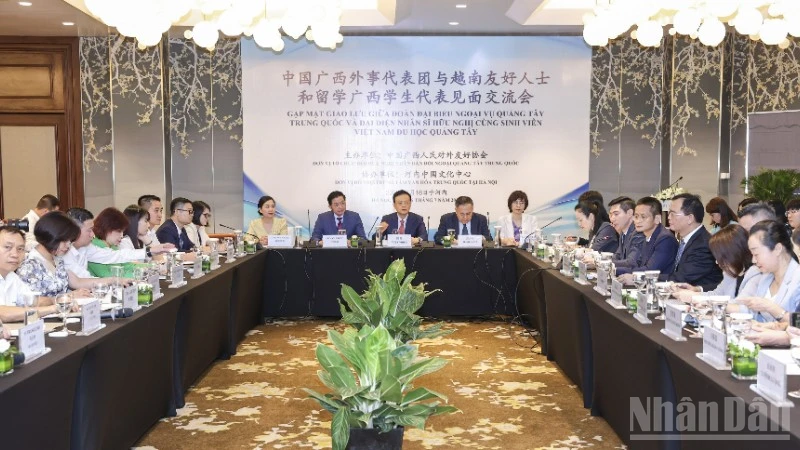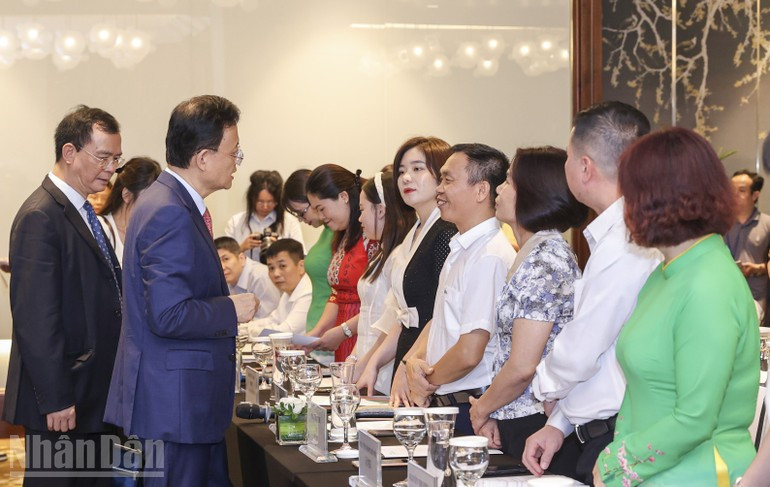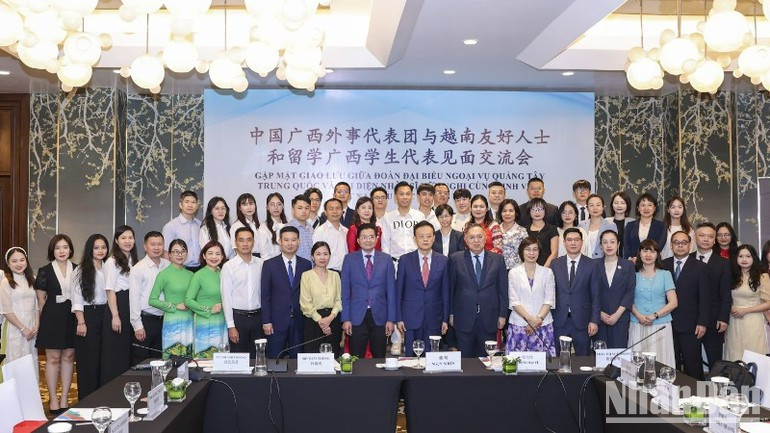
An overview of the meeting with scholars and students who studied in Guangxi, China. (Photo: KHANH LAN)
This is one of the activities within the framework of the visit and work in Viet Nam of the Foreign Affairs Delegation of the Guangxi Zhuang Autonomous Region, China, led by Wei Ran, Director of the Foreign Affairs Office and President of the People's Friendship Association of the Guangxi Zhuang Autonomous Region, China.
Speaking at the opening of the meeting, Wei Ran expressed his joy at meeting friendship figures and students in Ha Noi; at the same time, he expressed his wish to listen to and absorb the opinions of students to improve the quality of training, helping them become friendship ambassadors to promote Guangxi–Viet Nam cooperation.
Emphasising that 2025 is the 75th anniversary of the establishment of China-Viet Nam diplomatic relations and also the China–Viet Nam People's Cultural Exchange Year, Wei Ran said that the two countries are making efforts to build a Community of Shared Future with strategic significance.
Wei Ran reviewed the historical milestones of the years when President Ho Chi Minh was active in the revolution in several localities and schools in Guangxi that trained tens of thousands of Vietnamese students, many of whom became pillars of the country, contributing to fostering the friendship between China and Viet Nam.
Affirming that education has always been a key area of cooperation between Guangxi and Viet Nam, Wei Ran stated that the number of Vietnamese students going to Guangxi reached a peak of 4,245 people in 2019; in 2023 alone, Guangxi received 3,764 Vietnamese students, the most among Chinese localities. Currently, there are nearly 4,000 Vietnamese students studying in Guangxi across 9 universities and 4 vocational schools training.
At the meeting, highly appreciating the role of Guangxi in cooperation with Viet Nam, Do Nam Trung, Director of the Northeast Asia Department (Ministry of Foreign Affairs of Viet Nam), affirmed that the important achievements of the relationship between Vietnamese localities and Guangxi as well as the Viet Nam–China relationship have all had the participation and active contributions of friendly personalities and thousands of Vietnamese students studying in Guangxi.
For his part, Trinh Dai Vi, Counsellor of the Chinese Embassy in Viet Nam, said that the relationship between the two countries is moving towards a second period of brilliant development with many effective cooperation mechanisms and vibrant cultural exchanges.
Counsellor Trinh Dai Vi said that during the 2025 China-Viet Nam Cultural Exchange Year, the two countries have organised many activities from cultural festivals to educational seminars. These activities have actively contributed to promoting and enhancing understanding and friendship between the people of the two countries.

Wei Ran, Director of the Foreign Affairs Office, President of the People's Association for Friendship with Foreign Countries of the Guangxi Zhuang Autonomous Region, China, greeted Vietnamese students attending the meeting. (Photo: KHANH LAN)
At the meeting, former students from Quang Ninh, Lang Son, Cao Bang, and Tuyen Quang shared their profound experiences while studying in Guangxi and made many practical suggestions to promote exchanges and cooperation between Vietnamese and Guangxi localities.

Delegates attending the meeting took a commemorative photo. (Photo: KHANH LAN)
Wei Ran hopes that this generation of students will become an active force in building the Vietnamese social community and promoting extensive cooperation between the two countries. Accordingly, he proposed three initiatives: telling good stories about the China–Viet Nam friendship to enhance understanding and solidarity; actively participating in friendly exchange activities, especially during the China–Viet Nam Humanitarian Exchange Year, commemorating the 75th anniversary of the establishment of Viet Nam–China diplomatic relations; and establishing an association of Vietnamese students who studied in Guangxi as a platform for connecting, sharing information, and promoting sustainable cooperation.
Source: VNA






.jpg)


